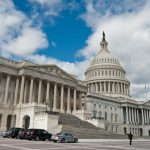 Two years ago, CPIP published an issue paper warning about the tremendous potential for abuse inherent in the America Invents Act’s newly-created administrative review programs. It now appears that several members of Congress are concerned as well. On December 5, 2016, a bipartisan group of New York representatives sent a letter to Michelle Lee, Director of the United States Patent and Trademark Office (USPTO), raising their concerns about abuse of the inter partes review (IPR) system by financial speculators.
Two years ago, CPIP published an issue paper warning about the tremendous potential for abuse inherent in the America Invents Act’s newly-created administrative review programs. It now appears that several members of Congress are concerned as well. On December 5, 2016, a bipartisan group of New York representatives sent a letter to Michelle Lee, Director of the United States Patent and Trademark Office (USPTO), raising their concerns about abuse of the inter partes review (IPR) system by financial speculators.
The IPR system permits anyone to challenge the validity of an issued U.S. patent in front of administrative patent judges at the USPTO. Unfortunately, as we predicted in our 2014 issue paper, the system has shown itself to be susceptible to several kinds of abuse, including rent-seeking, evasion of estoppel and time bars, seriatim attempts at invalidation, and retaliation.
The New York representatives draw attention to abuse that occurs when the IPR system is used merely to influence the stock price of a targeted company. The basic strategy used by the hedge funds and financial speculators is simple: (1) take a short position on a patent-dependent company so that profit comes if the stock loses value, (2) file an IPR against that company’s patents so that the stock loses value, (3) realize the profit from the short position. The letter notes:
“As you are aware, hedge funds and other financial speculators continue to use IPR proceedings for their enrichment, while also burdening the owners of valuable patents. With more than 50 such petitions having been filed, typically as part of a secret stock-shorting scheme or in an attempt to extort substantial payments from patent owners, these proceedings raise great concern. A particularly troubling aspect of this strategy is repeated instances of filing petitions challenging the same patent claims on grounds substantially identical to those previously denied institution in prior-filed petitions. In essence, this “try-again” practice affords hedge funds multiple bites at the apple, in which the PTO’s reasons for denying an IPR petition are used as a how-to guide to filing another petition. We are also concerned this practice inspires collusion by parties who would otherwise be time-barred from bringing their own IPR because the PTO has been permitting such parties to join these hedge funds in their IPR. Furthermore, it is our understanding that the statute appears to foreclose that option. Allowing these open-ended challenges perpetuates such disputes rather than resolving them. They also undermine the investment-backed expectations of patent owners in “quiet title” in their intellectual property, depreciates the market value of their businesses, and harms their ability to advance their research and development programs.”
In order to address the problem, the representatives urge the USPTO to start using the tools provided in Sections 314(a), 316(a), and 325(d) to prevent abuses of the system. In particular, the USPTO should prevent IPR proceedings from being instituted when they are an abuse of process or when the arguments are similar to those previously raised against the patent.
The letter was signed by Nydia Velázquez (NY-12), Chris Collins (NY-27), Louise Slaughter (NY-25), Peter King (NY-2), Eliot Engel (NY-16), Elise Stefanik (NY-21), Yvette Clarke (NY-9), Paul Tonko (NY-20), Kathleen Rice (NY-4) and Steve Israel (NY-3).